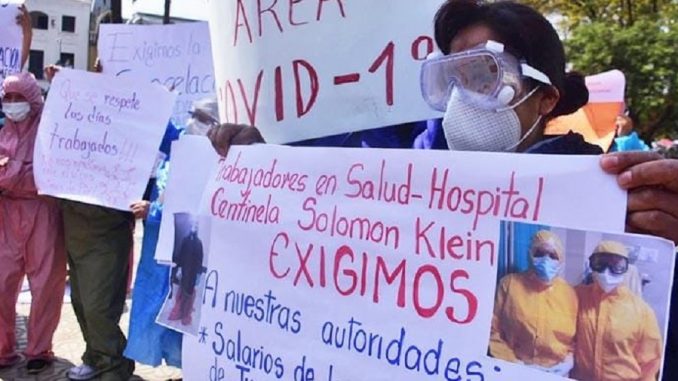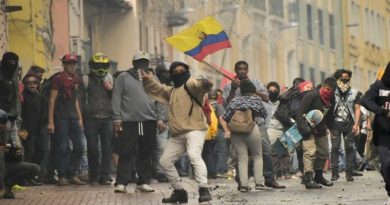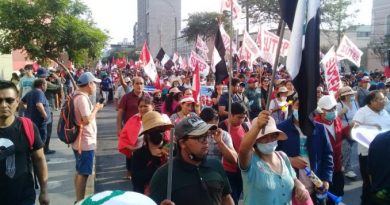Bolivia: factory expanded, conflicts in health and mining
To the claim of the Huanuni miners for months of back wages, a series of struggles in the private sector are added in Bolivia. So much so that the COB ordered to ask the Federations and Departmentals about the number of conflicts, dismissals and violation of labor law. The leadership of the COB says to consult"In order to take the necessary actions", without specifying which ones. Late they remember, after the white massacres of the bosses and the State.
The situation is critical, so much so that the CGTFB National Expanded, the Confederation of Factory Workers, for Wednesday 16 and thursday 17. The rescheduled call comes after months of pandemic, where employers have taken advantage and advance with their white massacre by firing thousands of workers. In addition to the suspensions, wage cuts or unpaid wages, loss of conquests, along with infections and deaths from COVID-19.
That is why the Altifiber’s workers continue their protest. They ask that the ministerial resolution for their immediate reinstatement be fulfilled and they managed to stop an attempt to evict the police with a tractor, against the booths built at the factory gate, where they stay.
At the same time, Duralit and Prosil workers have been without wages for months, like Vidrio Lux, which confirmed the definitive closure of its glass container production plant in Cochabamba. Workers from the Tomy tannery also protest in this district, shoe producer. Because, the day 9 there was an important mobilization of factory workers from Duralit, Asked, Lux glass, Sendtex, Auto Móvil Club and Tomy. While in Santa Cruz, Workers of the oilseed Rico-IOL demand payments and those laid off from Industrias Belén carry out a blockade, before the breach of their reinstatement.
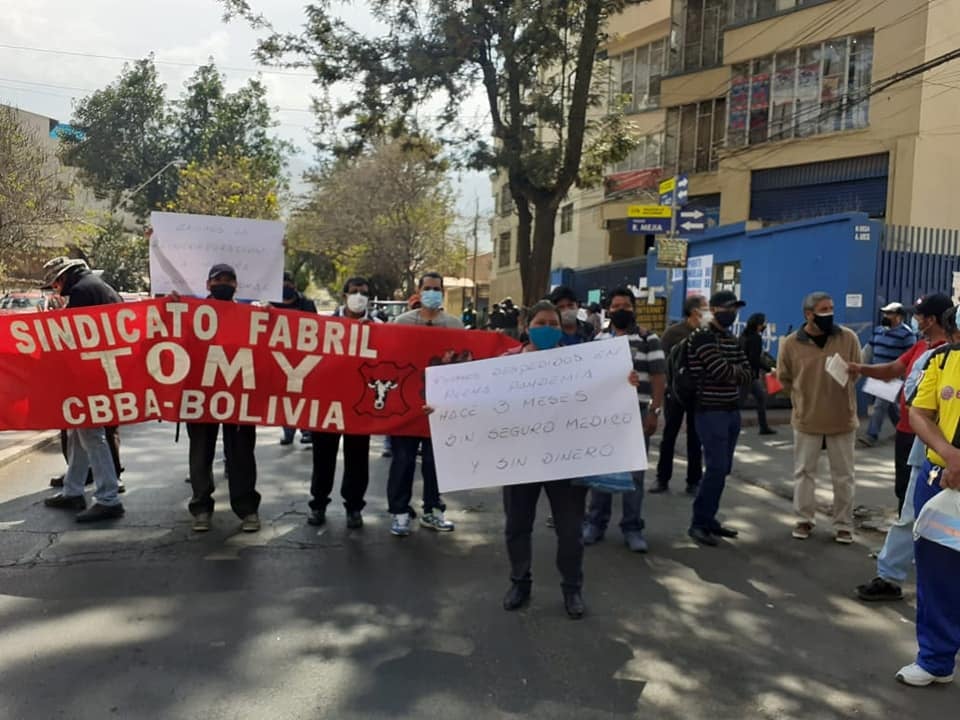
Serious problems in the mining sector
In Huanuni, the miners held an assembly on Wednesday 9 because they have three months of wages owed, for the historic debt of the Vinto company, with the state mining company. Due to the laziness of the central state, by not injecting funds into the Vinto Smelter and thus recovering lost mineral markets. Policy reiterated by the governments of Evo and now Áñez, leading these companies to crisis.
It is that many times the Sindicato de Trabajadores Mineros de Vinto, has denounced that, since this foundry was nationalized, no operating or start-up capital received, despite promises to provide that financial support. And advance the industrialization of mining.
Recent reports indicate that, between 2006 Y 2019, sales by 13 years of mineral exports from Bolivia, exceeded U $ S 40 billion, by 19 millions of tons. With the highest peak in 2019, with 4.250 million dollars in sales, and a participation of 48% on the total exported from the country. What clearly shows the value of mining for Bolivia. With just the 0,2% of the income from these millionaire sales, the total salary debt to Huanuni is covered.
further, if Añez could give US $ 100 million to the Santa Cruz employers of the Eastern Agricultural Chamber, in a loan that will not be reimbursed and will be paid by the people to the IDB; It would well have to give the US $ 80 million to cancel all the debt with the mining families of Huanuni and Colquiri.
On the private side, the Paititi mining company in Santa Cruz had already carried out a white massacre with the "disengagement" of 220 workers. The Union rejected it and the Mining Federation demanded, at the end of august, reincorporate all the comrades of the Paititi Mining Metallurgical Union and protested in front of the courthouse.
For COVID, the San Cristóbal Mine in Potosí, of Sumitomo Corporation one of the largest industrial groups in Japan, suspended its operations at the Toldos camp for the third time, next to the municipality of Colcha K, being from the zinc deposits, world's largest lead and silver. Even the Oruro mining cooperatives took over the facilities of the regional Mining Corporation on Friday, COMIBOL. Joaquin Andrade, president of COMIBOL, He is once again denounced for trying to hand over state mining areas, hire family members and create new positions.
It is necessary to advance in paying all workers' debts and a reactivation plan, democratically resolved by workers, with the expropriation and nationalization of private and transnational companies, among them the mining companies that concentrate the business due to the historic jump in the international price of gold, with billionaire income[1] that leave just a 1,5%, a 3% O 5% royalties to the country and regions. In addition, it is necessary to invest in its industrialization to generate added value in all mining production.
Health protests and other conflicts
On the health side, on Friday 11 CNS nurses held a sit-down strike demanding a salary level commensurate with their professional training. While the Medical Union of the National Health Fund (CNS) warns with taking measures to reject the change of the regional management of La Paz. They denounce that this causes a delay in meeting their demands, such as providing supplies, of reagents, biosecurity equipment, replenish affected personnel, in the expansion of infrastructure and in discontinuing acquisitions and contracting, what threatens personnel and public health.
While in Tarija, Health workers continue on hunger strike in the Guadalquivir center. They denounce that the contracts promised by the Ministry of Health did not arrive for those on the front line against COVID-19, they do not have the salary deposit and they are not aware that they have paid. And the day 5 in Cochabamba, there was an important march of health professionals and workers for salaries, life insurance and the provision of biosecurity equipment. This, when the Bolivian Medical College reports that 140 professionals died, ranking as the second country in Latin America with the most doctors killed by coronavirus.
On the heavy transport side of Santa Cruz, it was warned that mobilizations could begin if YPFB, Bolivian Fiscal Oil Fields, does not solve the diesel shortage in the department, which complicates the transportation of food, agriculture and industries. There is a shortage in Potosí and also concern in Oruro.
At the same time, Environmentalists denounce forest fires in six municipalities of Santa Cruz, taking back the agribusiness. While promoting a Popular Action against the decrees 4232 Y 4238 that endorse transgenic seeds in Bolivia. In that same department too, workers protest for the return of their contributions to the Pension Fund Administrator (AFP), They evaluate radicalizing their protest and blocking the roads.
Expanded of Fabriles, resume the fight against the government and the capitalist adjustment
In this panorama of conflicts and before the National Expanded of Fabriles, there are media that announce that Juan Carlos Huarachi could attend, of the COB. Central that only seems to be concerned about the complaint they made in the Court of The Hague, when they're only chicanas between accordionists. Because the situation of union bureaucrats or a supposed fascist government is not at stake here, as they want to falsely make it look like. But the jobs, the salaries, health and other claims of thousands and thousands of workers and popular sectors for the betrayal of that leadership.
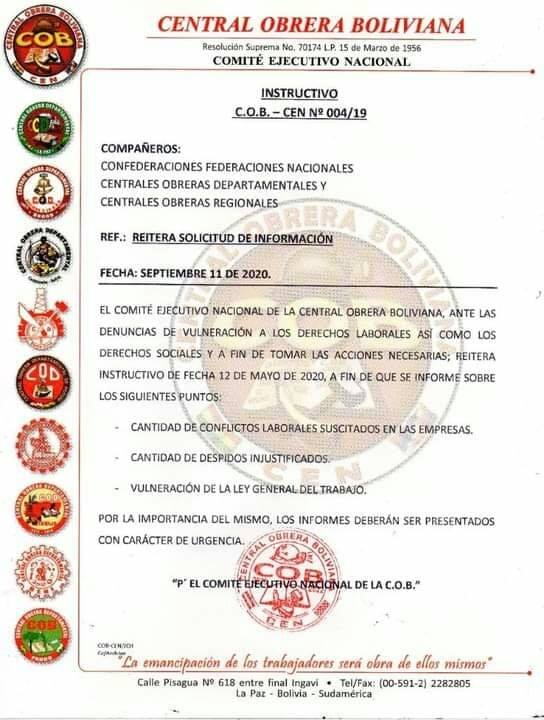
But this Expanded appears as an opportunity to demand that the fight for health be resumed, job, salary, for a guaranteed social income and health for all the people. And fight for Áñez and his ministers to leave, against the pact and the co-government together with the MAS in Parliament. Beyond mutual complaints, like the credit of $ US 327 million from the IMF that entered the Central Bank in April, allegedly without the authorization of the Legislative Assembly. If those resources are, are essential in the face of the health emergency and social needs. They cannot be about campaign disputes.
We must resume the fight. United workers, they will never be defeated! Employment stability! Fight until you win! Time to go for new leaders, removing the treacherous conductions that respond to the masism and other policies in the CGTFB, General Confederation of Manufacturing Workers of Bolivia, headed by Vicente Pacosillo. And from the COB, those that must respond to the grassroots mandate for these urgent demands and for the unity of the struggles.
This crisis is also not resolved with presidential debates of candidates, very focused on their campaigns, but far from the demands of the people. They organize electoral caravans, but they turn their back on the marches, strikes and protests. From Catacora by the MAS, to the former president Mesa of the right, together with other adjusters such as Áñez or Tuto Quiroga, they have nothing new to offer in their campaigns as a way out of the crisis, rather than continue unloading it on the backs of the working class, peasants and villages.
The "campaign" that is needed is to support and unite all conflicts. To ensure that each company or factory that closes, suspend or dismiss is nationalized and begins to operate under the control of its workers. Immediate reinstatement of each dismissed. For the full and timely payment of wages in mines such as Huanuni and in all companies. Enough of salary debts in the pandemic. For a bonus or guaranteed social income for all workers, according to the family basket.
There is money and it must go to wages, Health, job, education and investment in COMIBOL and in all mines. Defense and reactivation of state companies. For an economic and social emergency plan, worker and popular. That's the way, together with the unity of the whole consistent left, to propose an alternative in Bolivia in favor of working people.
LIS Correspondent
[1] In 2019 more than 12.105 million bolivianos in gold for about 38,7 tons, concentrating 8 companies the 84% of exports. In this 2020, son 22 trading companies that exported gold. Among the main ones are the Company Bolivia Precious Metales S.A, Boligroup Traiders S.R.L, Goldway S.R.L, Union 6 de Agosto S.R.L., Golden Rain S.R.L., Yellow Tree S.R.L, Koryaliri S.R.L. y Ham Khor S.R.L.

